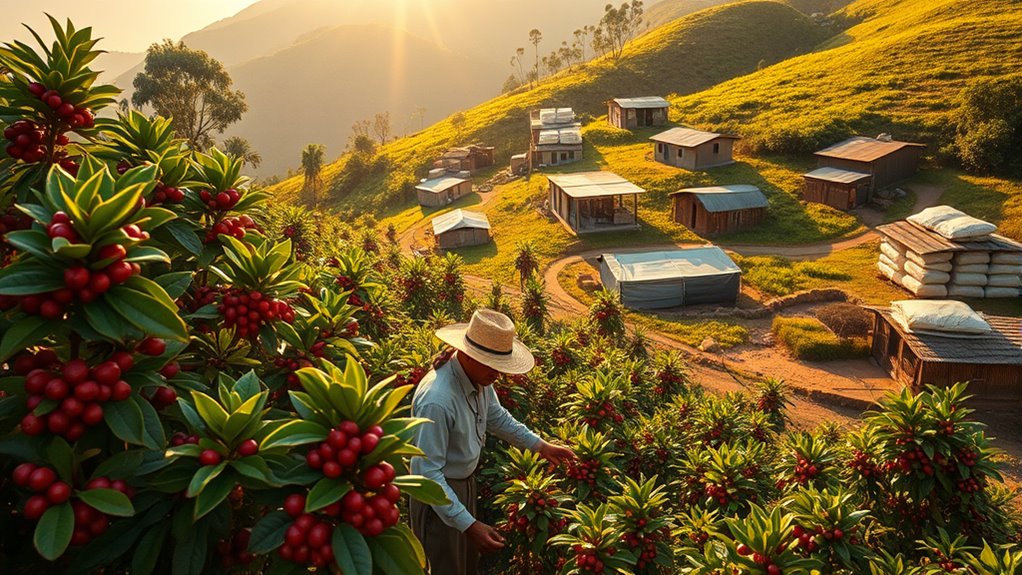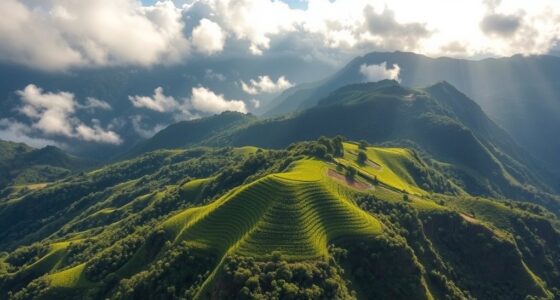Fair Trade and Direct Trade both aim to benefit coffee farming communities, but they do so differently. Fair Trade focuses on certified standards, paying premiums that support community projects like education and healthcare. Direct Trade builds personal relationships, often resulting in higher transparency and better wages through direct negotiations. Your choices influence how farmers grow and improve their livelihoods. If you’re curious about which approach might be more impactful, there’s more to uncover below.
Key Takeaways
- Fair Trade provides guaranteed premiums and community development funds, improving infrastructure, education, and healthcare for farming communities.
- Direct Trade fosters personalized relationships, enabling farmers to receive better prices and invest directly in farm improvements.
- Fair Trade certification ensures transparent supply chains and fair wages, supporting community stability and social benefits.
- Direct Trade emphasizes sustainable practices and quality, often resulting in more consistent income and improved working conditions.
- Both models empower farmers and communities, but Fair Trade relies on certification standards, while Direct Trade depends on personal relationships.

When choosing where to buy your coffee, understanding the differences between Fair Trade and Direct Trade can make a big impact. These two approaches shape not only the quality of your coffee but also the livelihoods of the farmers who cultivate it. Fair Trade emphasizes establishing fair prices, ethical labor practices, and community development, but it also prioritizes supply chain transparency. This transparency means you can trace the coffee back to its source, ensuring that farmers receive fair compensation and work under safe conditions. It seeks to create a more equitable system where farmers are empowered to improve their livelihoods and invest in their communities. By paying premiums that go directly to farmers and cooperatives, Fair Trade aims to foster long-term stability and social benefits. This can result in better wages, improved infrastructure, and access to education and healthcare for farming communities.
On the other hand, Direct Trade takes a more personalized approach. It involves buyers establishing direct relationships with farmers or cooperatives, often bypassing large intermediaries. This model allows for more immediate communication and negotiation, giving farmers better control over prices and quality standards. Because of this direct connection, supply chain transparency is usually higher, and buyers can ensure that farmers are paid fairly and treated ethically. Farmer empowerment is central to Direct Trade, as it encourages sustainable farming practices and rewards quality over volume. When you buy coffee through Direct Trade, you’re often supporting smaller farms and fostering a genuine partnership that benefits both parties. This approach can lead to more consistent income for farmers, better working conditions, and investments in farm improvements, which in turn can boost the overall quality of the coffee.
While both Fair Trade and Direct Trade aim to support farmers and improve sustainability, they do so through different mechanisms. Fair Trade offers a structured certification process that guarantees certain standards, including supply chain transparency and fair wages. It provides a safety net and promotes community development projects. Conversely, Direct Trade relies on relationships and trust, often resulting in more tailored and responsive arrangements that directly benefit farmers. Your choice can influence the degree of transparency, the level of farmer empowerment, and the directness of support you provide. By understanding these distinctions, you can make more informed decisions that align with your values and positively impact coffee farming communities. Whether you prioritize the certification standards of Fair Trade or the personalized touch of Direct Trade, your purchase can contribute to a more ethical and sustainable coffee industry.
Frequently Asked Questions
How Do Fair Trade and Direct Trade Certifications Differ Legally?
You might wonder how fair trade and direct trade certifications differ legally. Certification standards set specific criteria that producers must meet, but legal definitions vary by country and organization. Fair trade certifications are often regulated by recognized bodies with formal legal requirements, while direct trade isn’t always legally defined, focusing more on relationships and transparency. So, the key difference lies in the formal legal standards versus voluntary agreements based on trust and direct relationships.
What Environmental Practices Are Encouraged by Each Trade Model?
You’re curious about the environmental practices encouraged by each trade model. Both fair trade and direct trade promote sustainable farming, urging farmers to use eco-friendly methods that protect soil health and water quality. They also emphasize biodiversity conservation, encouraging farmers to preserve native plants and wildlife. While fair trade often requires adherence to specific standards, direct trade fosters innovative, localized practices that support environmental health, ensuring the coffee’s quality and sustainability for future generations.
How Do Consumer Perceptions Influence Fair Trade and Direct Trade Choices?
Your perceptions shape your choices, especially when it comes to coffee. You often rely on consumer trust and ethical branding to decide whether to buy fair trade or direct trade coffee. If a brand emphasizes transparency and social responsibility, you’re more likely to support it. Your awareness of ethical practices influences your buying decisions, encouraging companies to prioritize fair treatment and sustainability, which benefits coffee farming communities directly.
What Are the Long-Term Economic Impacts on Farmers?
You can help farmers by understanding the long-term economic impacts they face. Market stability is essential; it ensures consistent income and reduces vulnerability to price swings. Income diversification allows farmers to rely on multiple sources, protecting them from crop failures or market fluctuations. By supporting practices that promote stability and diversification, you contribute to a more resilient farming community, enabling farmers to plan for the future and improve their livelihoods over time.
How Do Supply Chain Transparency Levels Compare Between the Two?
When comparing supply chain transparency levels, you’ll find that direct trade typically offers higher supply chain visibility than fair trade. You get closer to the source, with clearer insights into farming practices and origins. Fair trade emphasizes fair wages and standards, but transparency can be less detailed. With direct trade, you actively access accurate, authentic information, ensuring better transparency levels and fostering stronger trust between farmers and consumers.
Conclusion
So, you might think fair trade guarantees better lives, but often, it’s just a label. Meanwhile, direct trade promises closer relationships and higher quality, yet it’s not foolproof. Ironically, both systems aim to help farmers, but sometimes, the real impact depends on your choice. Next time you sip that coffee, remember: the journey from farm to cup is full of surprises—some better, some worse—regardless of what label’s on the bag.









